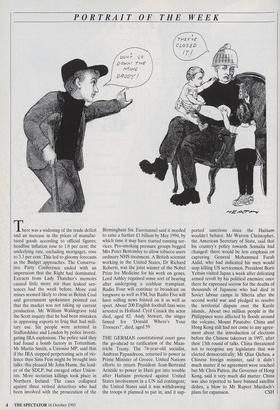PORTRAIT OF THE WEEK
There was a widening of the trade deficit and an increase in the prices of manufac- tured goods according to official figures; headline inflation rose to 1.8 per cent; the underlying rate, excluding mortgages, rose to 3.3 per cent. This led to gloomy forecasts as the Budget approaches. The Conserva- tive Party Conference ended with an impression that the Right had dominated. Extracts from Lady Thatcher's memoirs caused little more stir than leaked sen- tences had the week before. More coal mines seemed likely to close as British Coal and government spokesmen pointed out that the market was not taking up current production. Mr William Waldegrave told the Scott inquiry that he had been mistaken in approving exports to Iraq that had mili- tary use. Six people were arrested in Staffordshire and London by police investi- gating IRA explosions. The police said they had found a bomb factory in Tottenham. Mr Martin Smith, a Unionist MP, said that if the IRA stopped perpetrating acts of vio- lence then Sinn Fein might be brought into talks; this pleased Mr John Hume, the lead- er of the SDLP, but enraged other Union- ists. More sectarian killings took place in Northern Ireland. The cases collapsed against three retired detectives who had been involved with the prosecution of the Birmingham Six. Eurotunnel said it needed to raise a further £1 billion by May 1994, by which time it may have started running ser- vices. Pro-smoking pressure groups begged Mrs Peter Bottomley to allow tobacco users ordinary NHS treatment. A British scientist working in the United States, Dr Richard Roberts, was the joint winner of the Nobel Prize for Medicine for his work on genes. Lord Ashley regained some sort of hearing after undergoing a cochlear transplant. Radio Four will continue to broadcast on longwave as well as FM, but Radio Five will have rolling news foisted on it as well as sport. About 200 English football fans were arrested in Holland. Cyril Cusack the actor died, aged 82. Andy Stewart, the singer famed for 'Donald Where's Your Troosers?', died, aged 59.
THE GERMAN constitutional court gave the go-ahead to ratification of the Maas- tricht Treaty. The 74-year-old socialist, Andreas Papandreou, returned to power as Prime Minister of Greece. United Nations efforts to return President Jean-Bertrand Aristide to power in Haiti got into trouble after Haitians protested against United States involvement in a UN aid contingent; the United States said it was withdrawing the troops it planned to put in, and it sup- ported sanctions since the Haitians wouldn't behave. Mr Warren Christopher, the American Secretary of State, said that his country's policy towards Somalia had changed: there would be less emphasis on capturing General Mohammed Farah Aidid, who had indicated his men would stop killing US servicemen. President Boris Yeltsin visited Japan a week after defeating armed revolt by his political enemies; once there he expressed sorrow for the deaths of thousands of Japanese who had died in Soviet labour camps in Siberia after the second world war and pledged to resolve the territorial dispute over the Kurile islands.. About two million people in the Philippines were affected by floods around the volcano, Mount Pinatubo. China and Hong Kong still had not come to any agree- ment about the introduction of elections before the Chinese takeover in 1997, after their 13th round of talks. China threatened not to recognise any legislature that was elected democratically; Mr Qian Qichen, a Chinese foreign minister, said it didn't much matter if no agreement were reached but Mr Chris Patten, the Governor of Hong Kong, said it very much did matter. China was also reported to have banned satellite dishes, a blow to Mr Rupert Murdoch's


























































 Previous page
Previous page